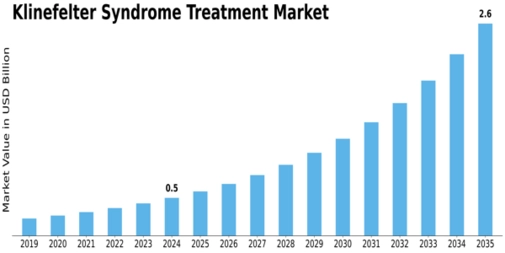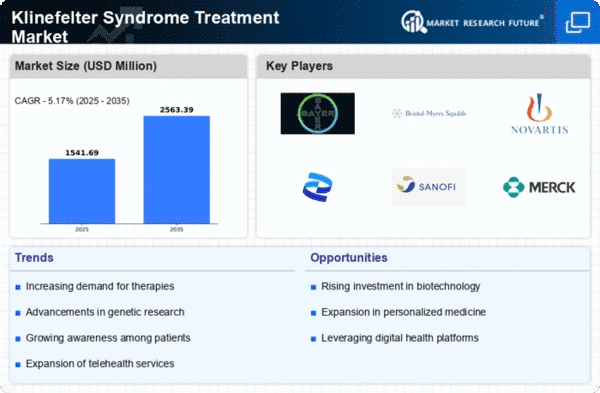Klinefelter Syndrome Treatment Size
Klinefelter Syndrome Treatment Market Growth Projections and Opportunities
In the Klinefelter Syndrome Treatment Market, the focus is on addressing the needs of people with Klinefelter syndrome, a genetic condition characterized by an additional X chromosome in males causing hormonal imbalance and various developmental problems.
HRT is one of many interventions available in this market to manage symptoms, enhance quality of life and address associated health issues. In this market Hormone Replacement Therapy (HRT) stands out as a major component of treatment for Klinefelter Syndrome that aims at treating testosterone deficiency that most people suffering from the conditions have. HRT therefore lowers symptoms such as decreased muscle mass, tiredness and weakness; it also causes infertility as well as promoting good general health. Ongoing research on optimizing hormone replacement therapies based on individual variability and long-term health outcomes shapes dynamics of the market.
Klinefelter Syndrome Treatment does not only involve hormone replacement therapy but also psychological and social aspects which are addressed in the Klinefelter Syndrome Treatment market. This support also includes counseling services offered through mental healthcare providers or organizations who are part of this sector too, that are able to assist affected persons deal with emotional challenges that arise from having this disorder including psychological counseling among other things. The industry has seen more development because now we know how it affects one’s mind state hence there should be multidisciplinary care.
Assisted Reproductive Technologies (ART) are another aspect found within the Klinefelter Syndrome Treatment market, which deals with fertility problems commonly experienced by those with Klinefelter’s syndrome. Couples suffering from Klinefelters's syndrome have been able to successfully get pregnant using In Vitro Fertilization combined together with Intracytoplasmic Sperm Injection (ICSI). Advances in reproductive medicine aimed at optimizing ART protocols towards enhancing chances of successful conception and pregnancy influence market dynamics in this area.
Other challenges facing the industry include treating possible co-morbidities related to the disorder, such as high chances of cardiovascular and metabolic diseases. Consequently, several research initiatives are focused on prevention strategies, lifestyle changes and targeted drug therapies for Klinefelter’s syndrome aimed at reducing long-term health risks associated with it. As such, market development is underpinned by a comprehensive healthcare delivery approach that looks at both immediate symptoms and long term health issues.






Leave a Comment